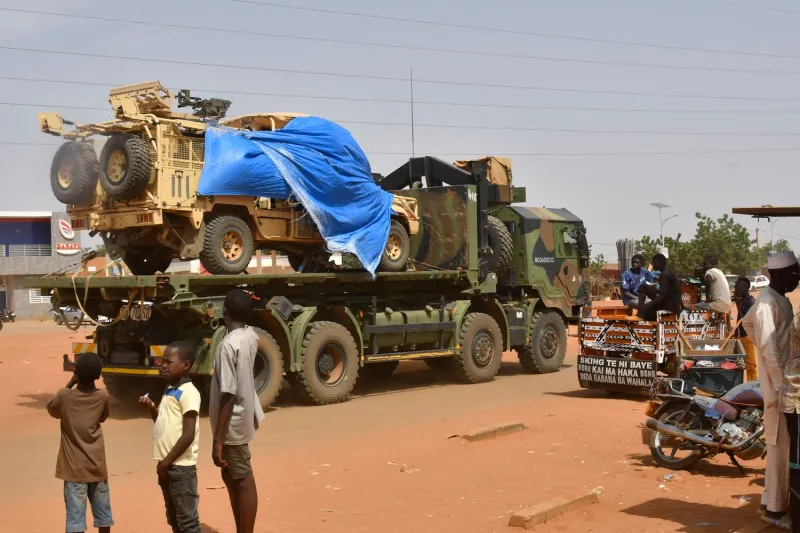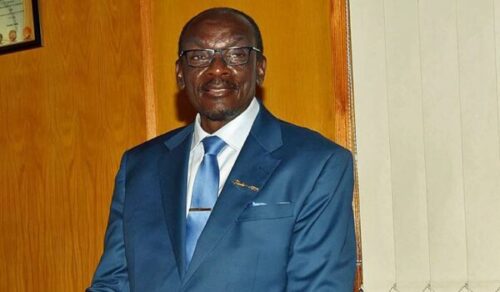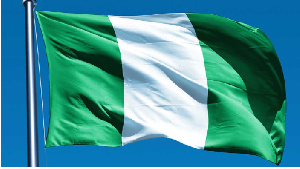News Africa
Achieving peace in Sahel requires multilateral support for Burkina Faso, Mali and Niger

Russia has now started calling for combined strategic partnership and international efforts to drastically address the complexities of rising insecurity and adopting a multilateral military force for countering terrorism in Africa, particularly in Burkina Faso, Mali and Niger. An official statement from the Russian Foreign Ministry called for finding common solutions and that peace can only be achieved through international efforts in the Sahara Sahel region.
Burkina Faso has had several military coup d’états, the latest took place in Jan. 2022. Mali (May 24, 2021) and Niger (July 26, 2023) witnessed similar political trends, and both now under military administrations and share startling critical accusations of corruption and malfunctioning of state governance against previous governments. Currently in its bilateral relations, Russia strongly considers Burkina Faso, Chad, Mali and Niger as conduits to penetrate into the Sahel region, an elongated landlocked territory located between north Africa (Maghreb) and West Africa region, and also stretches from the Atlantic Ocean to the Red Sea.
As a matter of fact, searching for common solutions to pertinent issues in a multi-polar world requires an extensive mutual cooperation with regional African associations and support from international community. After disparaging, using derogatory language for foreign military forces for their failure in ensuring security in the West African Saharan region, and encouraging a number of French-speaking West African countries to abruptly abrogate military relations with United States and France, Russia has now started calling for international efforts to help Burkina Faso, Mali and Niger.
The situation relating to frequency of militant activities and insecurity might have a different approach. Now the Russian Foreign Affairs Ministry in mid-March, 2024 said there was the necessity to drastically address the rising insecurity in the Sahel region, but in order to attain peace requires engaging the global support and international security institutions.
Russian Deputy Foreign Minister Sergey Vershinin drew the attention of Special Representative and Head of the UN Office for West Africa and the Sahel (UNOWAS) Leonardo Santos Simao to the fact that achieving peace in the Sahel Region hinges on international efforts to help Burkina Faso, Mali and Niger, according to the Russian Foreign Ministry’s statement made available at the official website.
“We specifically drew Simao’s attention to the fact that a sustainable settlement in the Sahel Region requires international support, namely for Burkina Faso, Mali and Niger, which are simultaneously engaged in countering terrorism in Africa and defending their own sovereignty,” the ministry emphasized.
In addition, the work of UNOWAS in promoting stability and responding to a wide range of challenges in West Africa and the Sahel was discussed in detail. “Russia expressed support for their efforts. We noted the importance of building them in a neutral and constructive manner in the interests of all countries of the region,” the statement noted.
Sergey Vershinin and Leonardo Santos Simao further noted the situation in West Africa and Sahel, “focusing on humanitarian and socio-economic challenges, uncontrolled migration, the lack of resources necessary for development, integration processes, including activities within the Economic Community of West African States and the Sahel Alliance.”
In the latest emerging developments in mid-March 2024, Col. Maj. Amadou Abdramane, spokesperson for Niger’s ruling junta, official announced the expulsion of the United States – ending the long-standing counterterrorism partnership between the two countries. “The government of Niger, taking into account the aspirations and interests of its people, revokes, with immediate effect, the agreement concerning the status of United States military personnel and civilian Defense Department employees,” he said, declaring that the security pact, in effect since 2012, violated Niger’s constitution.
The United States has roughly 1,000 military personnel and civilian contractors deployed to Niger, most of them clustered near the town of Agadez, on the southern fringe of the Sahara desert, at Air Base 201. Known locally as “Base Americaine” – the outpost serves as the linchpin of the military’s archipelago of bases in North and West Africa and a key part of America’s wide-ranging surveillance and security efforts in the region. Since the 2010s, the United States has sunk roughly a quarter billion dollars into the outpost. It has trained several military personnel for Niger.
As monitored by this article author, Mali also terminated its military contract with France. Mali together with its deep-seated impoverished neighbouring countries, under the governance of fragile military juntas, are potentially breeding grounds for extremist activities. Niger shares distinctive borders with Burkina Faso and Mali, as well as Chad and Algeria in Sahel region. These countries have pledged their support to Niger, as the Economic Community of West African States (ECOWAS) continually looks for mechanisms to resolve the crisis in the entire region.
Suffice to note here that ECOWAS has declared fierce opposition to military’s infiltration into politics and primarily eager to restore constitutional order. It shares the same position with the 54-member continental organization, the African Union. Critics, however, say Russia has noticeably declared its support for the military appearance into political scene, and further weighed in absolutely on their delay to set deadlines for transition to constitutional government in Burkina Faso, Mali and Niger.
Notwithstanding all that, Burkina Faso, Mali and Niger have exited the regional bloc, ECOWAS and are also dismembered out of the African Union. The African Union has issued the Africa Governance Report 2023 which focuses on unconstitutional changes of government in Africa. The Malabo declaration (April 2022) also urged to strictly adhere to what was referred as the Lomé Declaration and the Johannesburg Declaration on ‘Silencing the Guns’ in Africa, adopted at the 14th Extraordinary Session on 6 December 2020.
The Accra Forum II also underscored commitment to facilitate the consolidation of constitutionalism in Africa through stakeholder engagement. A number of external countries, dealing with military governments within bilateral framework, have utterly ignored the standing protocol guidelines and declarations of both the ECOWAS and the African Union.
Given the case of and with particular reference to Russia, the Accra Forum II condemned external interference on peace and security matters in Africa. In addition, African leaders have expressed grave concern over the resurgence of military takeovers and further urged adoption of serious measures to intensify efforts at addressing the root causes of coup d’etats. In pursuit of geopolitical clout, Russia is expanding its military tentacles aggressively beyond its horizons, penetrating into Sahel Sahara where mostly are the Francophone.
Paradoxically, Russia has never come under military rule since Soviet’s collapse. On March 15-17, Russia held the presidential election as stipulated by the constitution. On the contrary, Russia has been encouraging West African military rulers to hold on to power, these leaders shuttle between their capitals and Moscow. For instance, Malian Foreign Affairs Minister, Abdoulaye Diop, had already visited five or six times, seeking political consultation with Moscow officials, since his government took over power. Burkina Faso, Chad, Guinea and Niger have followed suit, most often taken political advice from Moscow. While under Moscow politico-military directions, Burkina Faso, Mali and Niger have allegedly accused ECOWAS leaders being manipulated by the West and Europe. Due to the rift between the regional bloc and the Francophones, ECOWAS is partially fragmented, African unity is stake as a result, so says policy experts interviewed for this article.
“The fact that terrorist groups have been increasingly active, especially in the north of the country, does not offer a favourable environment for launching an election campaign,” Foreign Minister Sergey Lavrov told the joint media conference in 2021 with Abdoulaye Diop. “We do understand the need to reinforce Mali’s counter-terrorism potential. In this connection, the Russian state supplies the necessary equipment, weapons and ammunition. We will do everything we can to prevent any threat to Mali’s statehood and territorial integrity,” he reassured his Malian counterpart. As for the nervous reaction of the French and some other Western representatives to Mali’s plans to work with a private military company from Russia (something the Prime Minister of Mali spoke openly about at the UN General Assembly session), this question is exclusively within the competence of the lawful Malian government. (Transcript available at the ministry’s website).
There have been several debates, academic discussions and propositions for adopting multilateral force to deal with the complexities of rising terrorism and ethnic conflicts in Africa. The South African Institute of International Affairs (SAIIA) has a detailed report with excellent suggestions. Southern African Development Community (SADC) has also offered an excellent example how to deal swiftly with terrorism.
The SAIIA report titled – Russia’s Private Military Diplomacy in Africa: High Risk, Low Reward, Limited Impact – says that Russia’s renewed interest in Africa is driven by its quest for global power status. Few expect Russia’s security engagement to bring peace and development to countries with which it has security partnerships. That report was based on more than 80 media publications dealing with Russia’s military-technical cooperation in Africa. He interrogates whether fragile African states advance their security, diplomatic and economic interests through a relationship with Russia.
The research report indicated that “Russia’s growing assertiveness in Africa is a driver of instability and that its approach to governance encourages pernicious practices, such as kleptocracy and autocracy in Africa.” It further says Moscow’s strategic incompetence and dominating opaque relations are adversely affecting sustainable developments in Africa. Russia, it appears, is a neo-colonial power dressed in anti-colonial clothes.
While Moscow’s opportunistic use of private military diplomacy has allowed it to gain a strategic foothold in partner countries successfully, the lack of transparency in interactions, the limited scope of impact and the high financial and diplomatic costs exposes the limitations of the partnership in addressing the peace and development challenges of African host countries, the report says.
The report explained the dimensions of Russian power projection in Africa, new frontiers of Russian influence and provided a roadmap towards understanding how Russia is perceived in Africa. It highlighted narratives about anti-colonialism and described how these sources of solidarity are transmitted by Russian elites to their African public. For seeking long-term influence, Russian elites have oftentimes used elements of anti-colonialism as part of the current policy to control the perceptions of Africans and primarily as new tactics for power projection in Africa.
In another related development and as well-known fact, Prime Minister Abiy Ahmed of the Federal Democratic Republic of Ethiopia, addressing the 36th Ordinary Session of the African Union (AU) held in Addis Ababa, told the African leaders and other invited guests, that “all existing conflicts and disputes on the continent, it is necessary to mobilize collective efforts to resolve them and must be confined to this continent and quarantined from the contamination of non-African interference.”
In addition to West Africa, there are other African regions experiencing threats of terrorism, militant groups and an Islamic State-linked insurgencies. Southern African countries, particularly Mozambique, have had cases of that. Mozambique suffered armed attack in March 2017. The insurgency, which began in 2017, has left thousands of people dead and led to the suspension of a €20 billion liquefied natural gas (LNG) project by the French TotalEnergies SA.
Mozambique now enjoys relative peace due to the SADC regional force. President Filipe Nyusi has been sharing this valuable experiences about the use of well-constituted regional military force for enforcing peace and security in his country. Creating regional military forces to fight threats of terrorism will absolutely not require bartering the entire gold or diamond mines for the purchase of military equipment from external countries, Mozambican President Nyusi emphasized several times at different conferences.
The 16-member Southern African Development Community (SADC) joint military force has the primary responsibility of ensuring peace and stability and for restoring normalcy in the Cabo Delgado province, northern Mozambique. It involves troops from Rwanda and the Southern African Development Community Military Mission (SAMIM). Rwanda offered 1,000 in July 2021. South Africa has the largest contingent of around 1,500 troops. External countries have enormously supported to stabilize the situation in Mozambique.
The rules, standards and policies, provision of the assistance as well as the legal instruments and practices are based on the protocols of building security stipulated by the African Union. It therefore falls within the framework of peace and security requirements of the the Southern African Development Community and the African Union.
At his point, it necessary to remind that on 28 November 2023, the United Nations Secretary-General António Guterres and the African Union Commission Chairperson Moussa Faki Mahamat convened their seventh African Union-United Nations Annual Conference in New York. In a joint communiqué issued at the end of the meeting, both reviewed progress in the implementation of the UN-AU Joint Framework for Enhanced Partnership in Peace and Security and the AU-UN Framework for the Implementation of Agenda 2063.
In particular, António Guterres and Moussa Mahamat again condemned the resurgence of unconstitutional changes of government in Africa and stressed the need for a timely and peaceful return to constitutional order in Burkina Faso, Gabon, Guinea, Mali, Niger and Sudan which are undergoing complex political transitions to sustain peace, development and human rights in the long term. There must be an extensive political awareness among the people in the Sahel region to focus on democracy, development, security and stability.
Against this backdrop, Burkina Faso, Mali and Niger have to seriously consider adopting multilateral security cooperation. Ultimately, West Africans have to emulate Mozambican case and apply it in the Sahel. But Burkina Faso, Mali and Niger have displayed defiance to the sanctions and crafting number of approaches and making their own efforts toward addressing security and development-oriented issues.
Summarizing aspects in this article from above points are related to the simple significance of the March 20 discussions between Russian Deputy Foreign Minister Sergey Vershinin and Special Representative and Head of the UN Office for West Africa and the Sahel (UNOWAS) Leonardo Santos Simao. As developments explicitly show, Russia has to stands in for multilateral force to speedily address the contradictions and complexities of security issues in that region. Constituting a regional force, rather than Russia continues playing monopoly, be interpreted a basic tenet in multipolar relations in which affected states, coordinating with foreign partners, pool resources together for a common goal. Basic principles of multipolar should be voiced on platforms in practical terms. The Economic Community of West African States (ECOWAS), the African Union, the United Nations, and bilateral and multilateral partners have to act together to endorse and to support drastic measures in addressing security questions and, most importantly, to ensure a peaceful return to constitutional and democratic government in the Republics of Burkina Faso, Chad, Mali and Niger in West Africa.
Source: Thepressradio.com| Kestér Kenn Klomegâh | Russia





